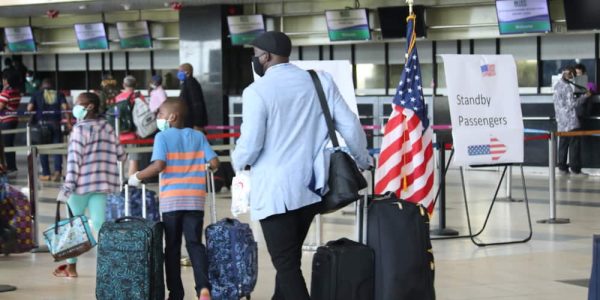Explainer: How the new US visa policy affects you as a Nigerian traveller

US Slams New Visa Rule on Nigerians: Single Entry, 90-Day Stay Now in Effect
Nigerians planning to travel to the United States will now face tougher visa conditions, following a major policy shift by the U.S. government. Under the new directive, non-immigrant visa applicants—including tourists, students, and business travellers—will only be granted single-entry visas valid for a maximum of 90 days.
The change, which replaces the previously common multi-entry visas, has raised concern among frequent travellers and prospective students, as it adds cost, inconvenience, and stricter limitations on movement. Here’s what this new rule means and how Nigerian travellers can prepare.
What Has Changed in the Visa Policy?
The United States government has revised its non-immigrant visa policy for Nigerian applicants. Under the new directive, Nigerians applying for certain categories of visas—such as visitor (B1/B2), student (F/M), exchange (J), and some work visas—will now be issued single-entry visas valid for a maximum stay of 90 days. This means you can only enter the U.S. once with that visa, and your stay must not exceed three months. Previously, many Nigerians were granted multiple-entry visas that allowed them to travel in and out of the U.S. for several years.
Who Does This Affect?
This new rule affects Nigerians seeking non-immigrant visas, particularly those for tourism, short business visits, family visits, study, or temporary work. It applies to first-time applicants and those seeking renewals. However, it does not affect immigrant visa holders, such as those seeking green cards or permanent residency. It also doesn’t apply to diplomatic or official visas issued to government representatives. Still, the change significantly affects thousands of ordinary Nigerians hoping to visit the U.S. for education, family, or business.
What This Means for Travellers
For most Nigerians, this new policy adds cost, inconvenience, and uncertainty. If you’re a frequent traveller to the U.S., you’ll now need to apply for a new visa every time you plan a trip. For example, if you attend conferences, have family in the U.S., or travel for medical treatment, each trip requires a fresh application and visa fee. Students and temporary workers also need to ensure their activities can be completed within the 90-day window—or risk complications. Any plan to stay longer or re-enter after returning to Nigeria will require a brand-new visa application.
Why the U.S. Made This Change
While the U.S. government has not released a detailed public explanation, this policy shift is likely tied to concerns about visa overstays, misuse of travel permits, and the need for tighter immigration control. It may also be a response to issues of diplomatic reciprocity—where the U.S. aligns its visa policy with how Nigerian authorities treat American citizens. Additionally, the change reflects a growing global trend where countries are tightening entry conditions and subjecting visa applicants to stricter vetting procedures, especially from nations with high rates of visa violations.
What Nigerians Should Do Now
If you’re planning to travel to the U.S., you need to plan more carefully. Choose the correct visa type that fits the purpose and duration of your stay. Ensure your documents clearly show your intent to return to Nigeria—this includes employment letters, proof of family ties, financial records, and school or business commitments. Because this new rule requires more frequent visa applications, also factor in the additional cost (visa fees, travel to the U.S. Embassy in Lagos or Abuja, logistics, and time). Apply early, and prepare for interviews that may include detailed personal and travel history checks.
How This Affects Nigerian Students and Workers
For Nigerian students, this policy can be especially tough. While the F-1 visa is still issued for study, the single-entry condition means students cannot easily travel home and return to the U.S. during school breaks without applying for a new visa. This could increase stress, financial burden, and uncertainty. Temporary workers on H or L visas may face similar challenges. They’ll need to structure their employment contracts to fit within 90 days or plan to re-apply if their work requires longer stays or multiple visits.
The Bigger Picture for Nigeria–U.S. Travel
This development is a major shift in how Nigerians interact with the U.S. immigration system. It reduces flexibility and increases the effort and cost involved in travel, especially for students, families, and professionals. It may also lead to lower numbers of Nigerian visitors and affect the U.S. economy in terms of education, tourism, and healthcare-related income. On the other hand, it could prompt Nigerian authorities to improve visa reciprocity for U.S. citizens, which might help restore balance in the long term.
Tips for Applicants
To navigate this change successfully, Nigerian travellers should apply early, prepare thoroughly, and be realistic about their stay and intentions. Ensure your documents are complete and updated. Show strong proof of ties to Nigeria and be prepared for thorough vetting—including potential checks on your social media, employment history, and prior travel records. It is also helpful to consult reputable travel agents or immigration lawyers if you’re unsure about the visa type or process. Most importantly, avoid shortcuts or false documentation—they could get you permanently banned from entering the U.S.

